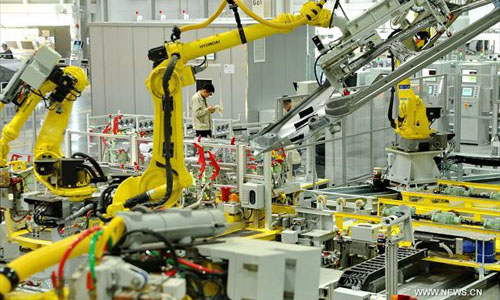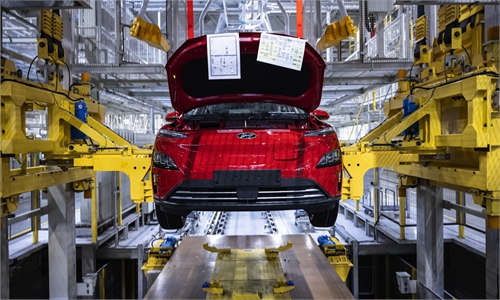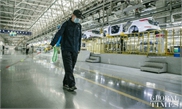Hyundai Steel to sell Beijing unit amid growing losses, intensifying competition from Chinese firms

Workers debug devices at a welding workshop in a factory of Beijing Hyundai Motor in Cangzhou, north China's Hebei Province, Sept. 8, 2016. China's manufacturing Purchasing Managers' Index (PMI) stood at 50.4 in September, unchanged from August, while the non-manufacturing PMI increased to 53.7 from the previous month's 53.5, official data showed on Oct. 1, 2016. (Xinhua/Mou Yu)
Hyundai Steel, South Korea's second-largest steelmaker, moved to sell its Beijing unit after years of sluggish sales. The decision was in line with expectations considering the downsizing of South Korean made cars in the Chinese market as well as fiercer competition from Chinese steelmakers, experts said.
Hyundai Steel has completed signing a memorandum of understanding with a potential buyer for Hyundai Steel Beijing Process, its Beijing plant, and the company will soon engage in pre-acquisition due diligence and finish selling its Beijing unit during the first half of this year, the Korea Herald reported last week, citing sources from the steelmaker.
The combined assets of Hyundai Steel's Beijing unit are estimated at around 464.8 billion won ($355 million), according to the report.
The Beijing entity's losses over the past five years have forced the company into a sell-off in order to stave off financial bleeding.
Hyundai Steel reported a net loss of 280.2 billion won in the October-December period last year, contrasting to a profit of 336.8 billion won a year earlier.
However, the company's units in North China's Tianjin Municipality and Suzhou, East China's Jiangsu Province, will not be affected and continue to operate as normal, the Global Times has learned from industry insiders.
The poor performance of Hyundai Steel's Beijing unit was largely related with the shrinking market share of Hyundai Motor and its sister firm Kia in the Chinese market over recent years. Hyundai Steel established its Beijing unit near the manufacturing plants of the two automakers in 2002 as a ready source of automotive steel sheets.
Hyundai Motor sold 350,277 vehicles in China in 2021, down 20.4 percent from the previous year, while Kia sold 127,005 vehicles, down 50 percent. The two companies' sales in the Chinese market have declined almost every year since 2016.
Apart from intensifying competition from Chinese carmakers and the rise of new-energy vehicles altering auto landscape, the lackluster performance of South Korea automakers is also attributed to China-South Korea dispute over the deployment of the Terminal High Altitude Area Defence (THAAD) system in early 2017, which drew a massive backlash among Chinese customers against South Korean brands.
Wang Guoqing, research director with the Beijing Lange Steel Information Research Center, told the Global Times on Monday that domestic steel mills are ramping up efforts in leveraging advanced technology while cutting costs over recent years, outperforming their foreign rivalries.
"The high-end steel sheets used in automobiles are becoming more localized, which represents a good alternative to imports," Wang noted, adding it has become the trend for the years to come.
Earnings across China's steel producers tumbled last year due to weak demand from property developers amid a nationwide real estate slump. Profits at key members of the China Iron and Steel Association (CISA) slid 72 percent in 2022 from a year earlier, data showed.
China's crude steel output in 2022 fell by 2.1 percent to 1.013 billion tons, marking a consecutive yearly decline, data from the National Bureau of Statistics showed.
Driven by pent-up demand after the nation's downgraded epidemic response and efforts to stabilize supplies and curb prices, China's steel industry is expected to record healthy and vigorous development this year, according to insiders at a membership conference organized by the CISA in February.
Global Times


